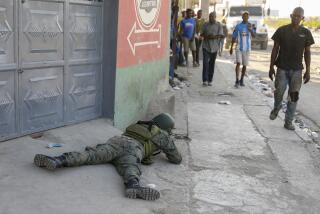Carter, Nunn Assail Handling of Haiti Crisis
- Share via
WASHINGTON — Only one day after the White House hailed the accord that staved off a U.S. invasion of Haiti, a wave of criticism erupted Tuesday over the agreement and how the Clinton Administration handles foreign policy--some of it coming from participants in the eleventh-hour mission to Port-au-Prince.
The criticism, which included complaints by former President Jimmy Carter about the State Department’s refusal to deal directly with Haiti’s military dictators, fueled a strong sense of uneasiness in Washington about the possible dangers and potential drawbacks of deepening U.S. involvement in the Caribbean nation.
Criticism and second-guessing are staples of Washington politics, but the openness of the complaints so early in an affair involving American troops on foreign soil was unusual. It reflected both uncertainty about how events in Haiti will unfold and the depth of opposition to U.S. involvement there that existed before President Clinton decided to intervene militarily.
Carter, who praised Clinton for his courage and his use of military might as a peaceful means of promoting democracy, nonetheless said it was “unfortunate” that the State Department’s policy would not allow official communications with foreign officials the United States disagreed with and deemed unfit to participate in diplomacy.
“This inability to communicate between our two countries is a very serious problem that might result in difficulties that are almost insurmountable,” he said.
The United States has never recognized the legitimacy of the regime led by Lt. Gen. Raoul Cedras, who gained power in 1991 in a coup that overturned the first free elections in Haiti’s history. Jean-Bertrand Aristide had been elected president in 1990 by an overwhelming popular majority and the Administration is committed to restoring him to office.
Meanwhile, Sam Nunn (D-Ga.), chairman of the Senate Armed Services committee and--along with Colin Powell, former chairman of the Joint Chiefs of Staff--a member of Carter’s special delegation, was privately criticizing the conflicting instructions emanating from the White House as the crisis deepened Sunday night.
On the one hand, the negotiators were being given detailed orders on what they were to obtain from the Haitian dictators, while on the other hand they were being ordered to wrap the mission up quickly and get out of Haiti before an American invasion force arrived, Nunn is known to have complained.
Prior to going to Port-au-Prince, both Nunn and Carter had publicly opposed an invasion and were longtime critics of the U.S.-led economic embargo against Haiti, which Carter charged has deprived innocent children of needed food and medicine.
During the final round of negotiations with the Haitian generals, Carter said he told them he was ashamed of what his country had done to Haiti.
In addition to the criticism from the outside, the White House was faced with heightened tensions inside its foreign policy apparatus as a result of the decision to use Carter as a special emissary.
“It created great tensions within the foreign policy team,” a senior Clinton aide said. “The rift between the White House and the State Department is widening. Some of the top people at State weren’t aware of what was going on.”
White House officials, including Vice President Al Gore, who strongly backed making Carter the chief emissary, supported the mission. But some State Department officials, including Deputy Secretary of State Strobe Talbott, opposed it. Talbott, sources said, was in favor of a last-minute diplomatic initiative, but opposed having Carter head it.
Republicans in Congress, where there was overwhelming opposition to an invasion, also criticized the Clinton policy for not insisting on the immediate ouster of the military dictators the President earlier had accused of being responsible for a reign of terror.
Under the agreement Carter obtained, the generals must step down from office by Oct. 15, though they are not obligated to leave Haiti. Republicans warned that the United States could become bogged down in a costly, extended occupation.
Aristide also assailed the accord for leaving Cedras temporarily in power.
Although President Clinton said the nation awoke to “a much better and very different day” than if U.S. troops had invaded Haiti, military officials warned that American soldiers could become casualties in a country steeped in violence.
Gen. John M. Shalikashvili, chairman of the Joint Chiefs of Staff, told reporters at the White House on Tuesday that violence between Haitian political factions could break out “at any moment.”
“And the nation needs to understand that we can be taking casualties at any moment and we need to be prepared for it,” he said.
More to Read
Sign up for Essential California
The most important California stories and recommendations in your inbox every morning.
You may occasionally receive promotional content from the Los Angeles Times.













